MarketMuse is a content optimization tool that analyzes top-ranking pages to guide content improvements.
However, it falls short when it comes to broader on-page optimization and AI features. If you're looking for a unified platform for managing your entire SEO content optimization workflow, you can find in other competitors.
I tested out a range of tools to find MarketMuse alternatives that deliver better features and offer a more cohesive platform. This article covers the top picks.
Why consider MarketMuse alternatives?
MarketMuse is a solid content optimization platform, especially for enterprise teams. But for many marketers—especially those working in small to mid-sized teams—MarketMuse can feel slow, complex, and expensive.
Here’s where it often falls short:
- Limited real-time editing feedback: Unlike competitors like Surfer, MarketMuse lacks live scoring or in-editor optimization suggestions.
- Steep learning curve: According to several reviews, MarketMuse isn’t the most intuitive platform. Navigating its features takes time, and onboarding new team members can slow your momentum.
- No visibility into AI search platforms: As Google AI Overviews, ChatGPT, and Perplexity reshape how users discover content, MarketMuse offers no visibility or tools to help you adapt.
- High cost: With enterprise pricing and no transparent tier system, MarketMuse may be out of reach for lean teams or individual creators.
12 best MarketMuse alternatives
Here are the best MarketMuse alternatives to help you create content that's optimized to rank.
1. Surfer
Surfer is a complete SEO content optimization platform designed for growth-focused teams. It covers the full content lifecycle—from keyword research and topic clustering to writing, optimizing, publishing, and updating content.
At the heart of Surfer is the Content Editor, which helps you write content that ranks by offering real-time guidance on keyword usage, structure, readability, and topical depth. As you write, your Content Score updates live.
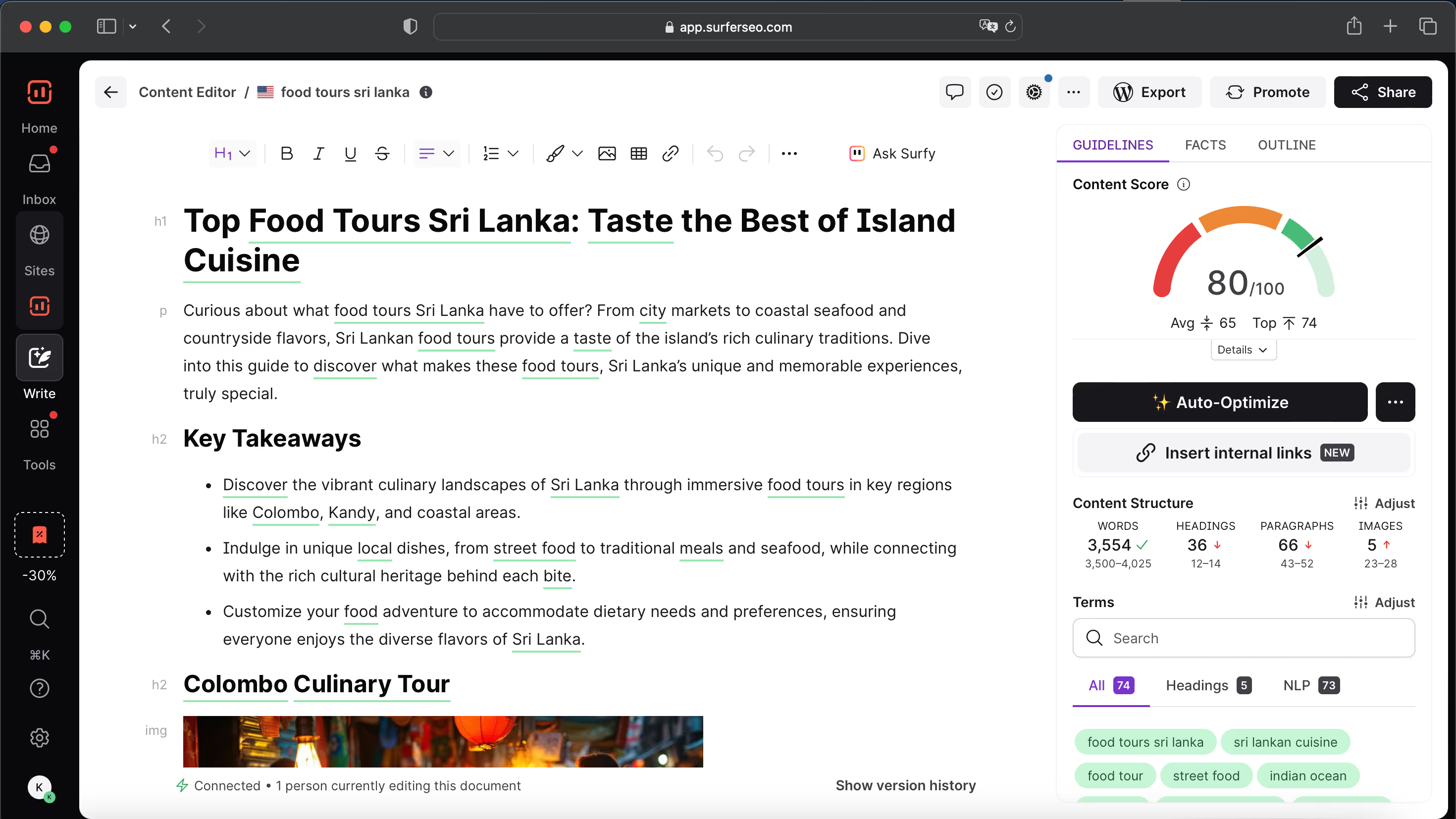
Our Content Score has a 0.28 correlation with rankings, giving your team a measurable target grounded in performance data.
Besides guidance, the Content Editor offers a set of features to help boost the score.
Surfer’s Auto Optimize and Coverage Booster features can enhance your draft with a single click, automatically inserting keywords, improving topic coverage, and ensuring the article meets best practices for SEO.
So while MarketMuse focuses mainly on keywords and phrases to include in your content, Surfer goes a step further by helping you fill content gaps.
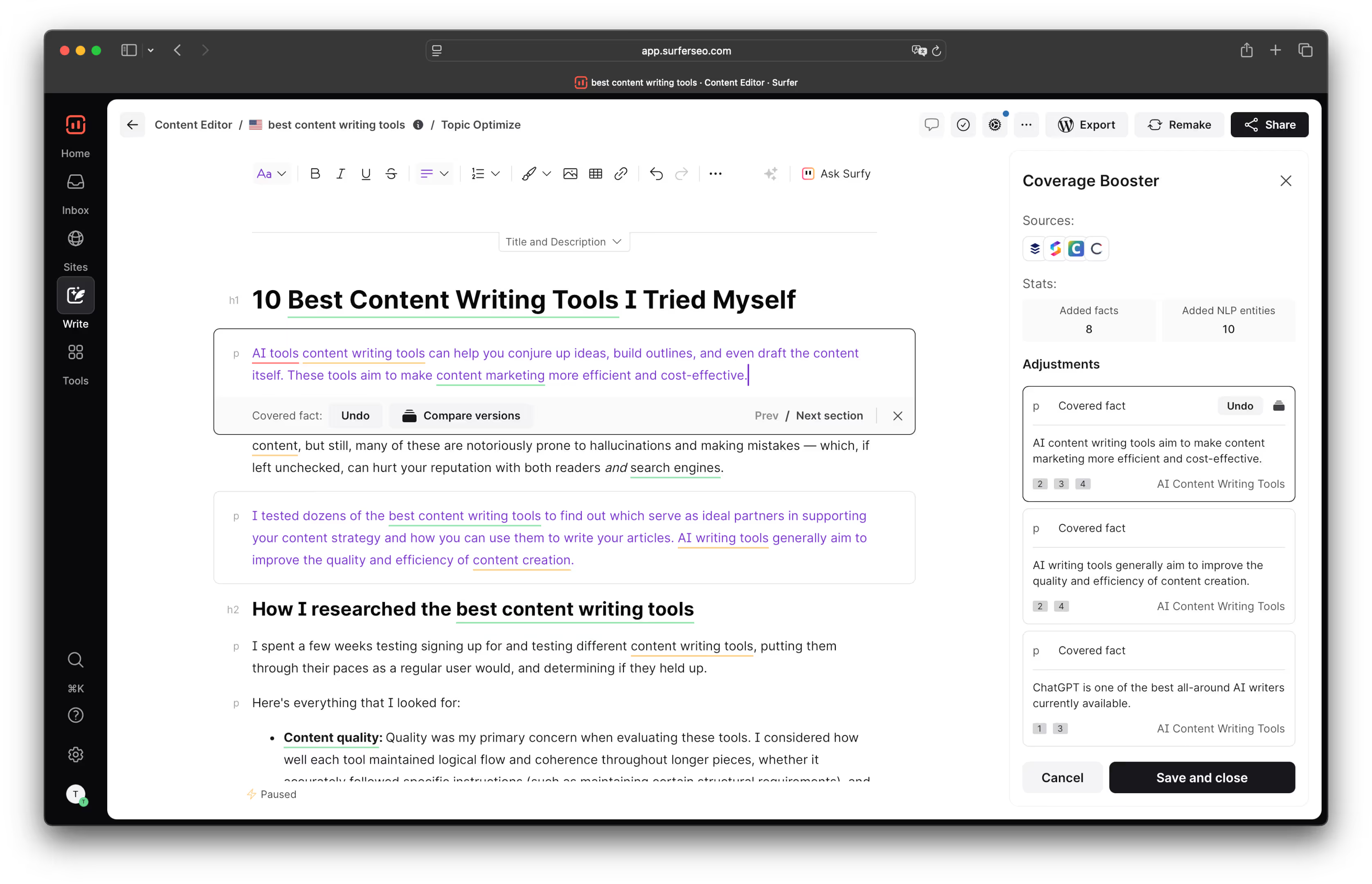
And while MarketMuse helps you discover internal linking opportunities, Surfer helps you automatically implement them in your content.
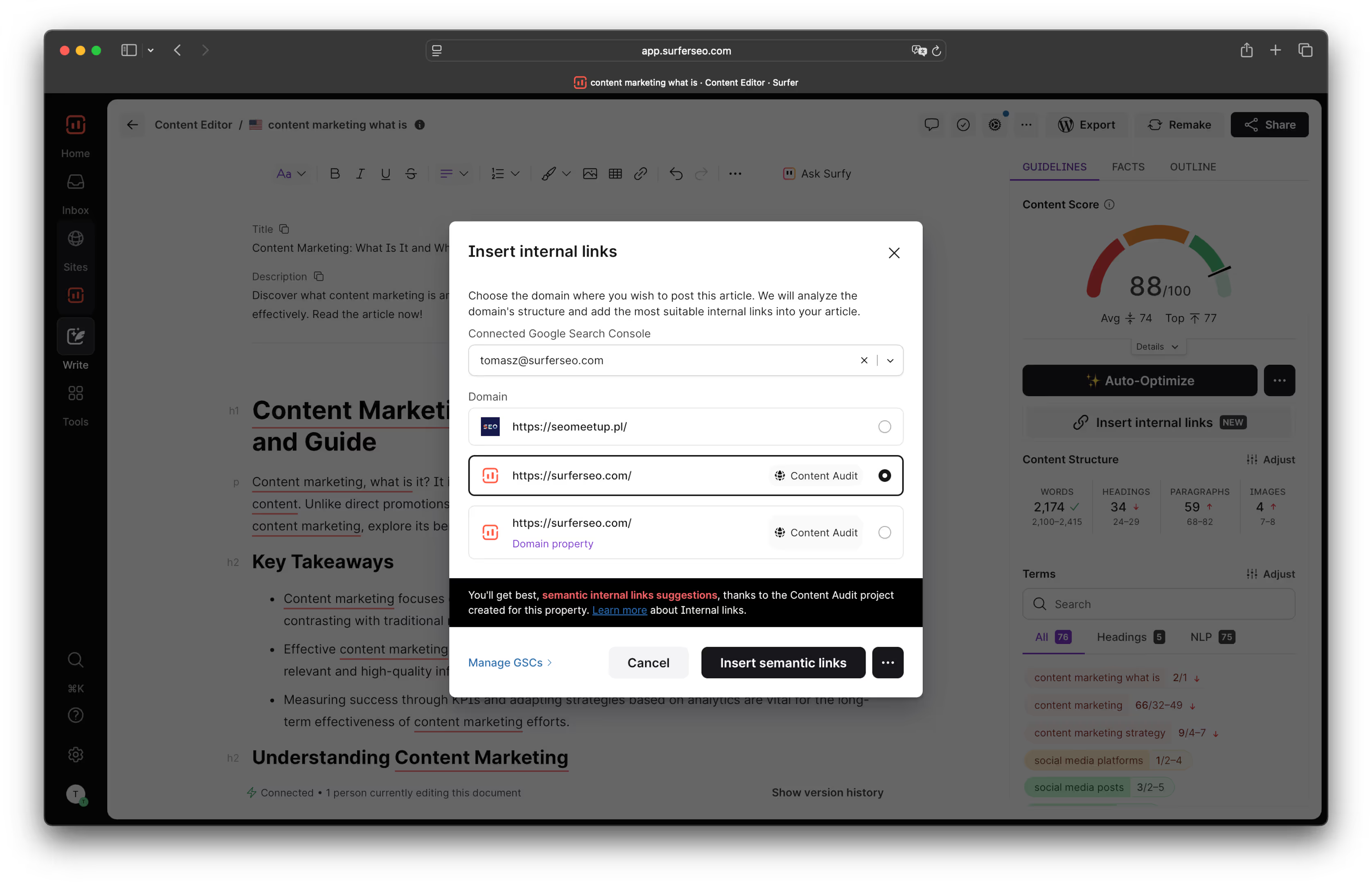
The Content Editor also features an AI writing assistant, Surfy. You can use Surfy for a multitude of tasks, to rephrase content, suggest improvements, and match your tone of voice.
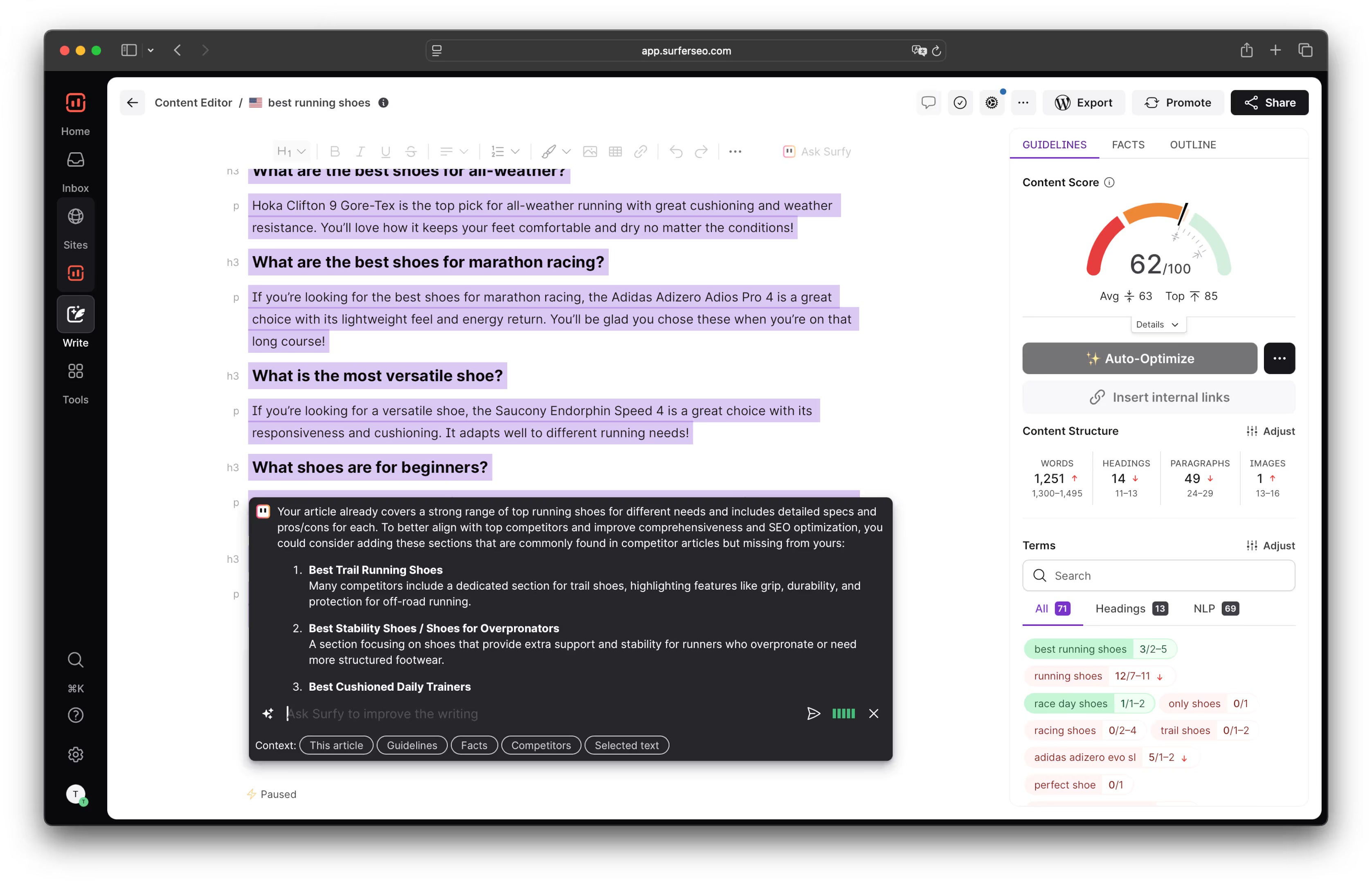
And if you want to experiment more with AI content, turn to Surfer AI. With Surfer AI you can create a fully optimized article in just a few clicks. This is something you cannot do with MarketMuse.
Beyond writing and optimization, Surfer helps maintain and grow your content performance over time:
- Content Audit flags underperforming pages and recommends updates.
- Topical Maps help you build full topic clusters to improve topical authority and win across entire niches.
- Internal Link Suggestions are powered by Google Search Console and can be inserted with one click.
- AI Tracker monitors your brand’s visibility in emerging AI search experiences like ChatGPT, Perplexity, and Google’s AI Overviews.
- Sites provides a live inventory of your published content with page-level performance insights.
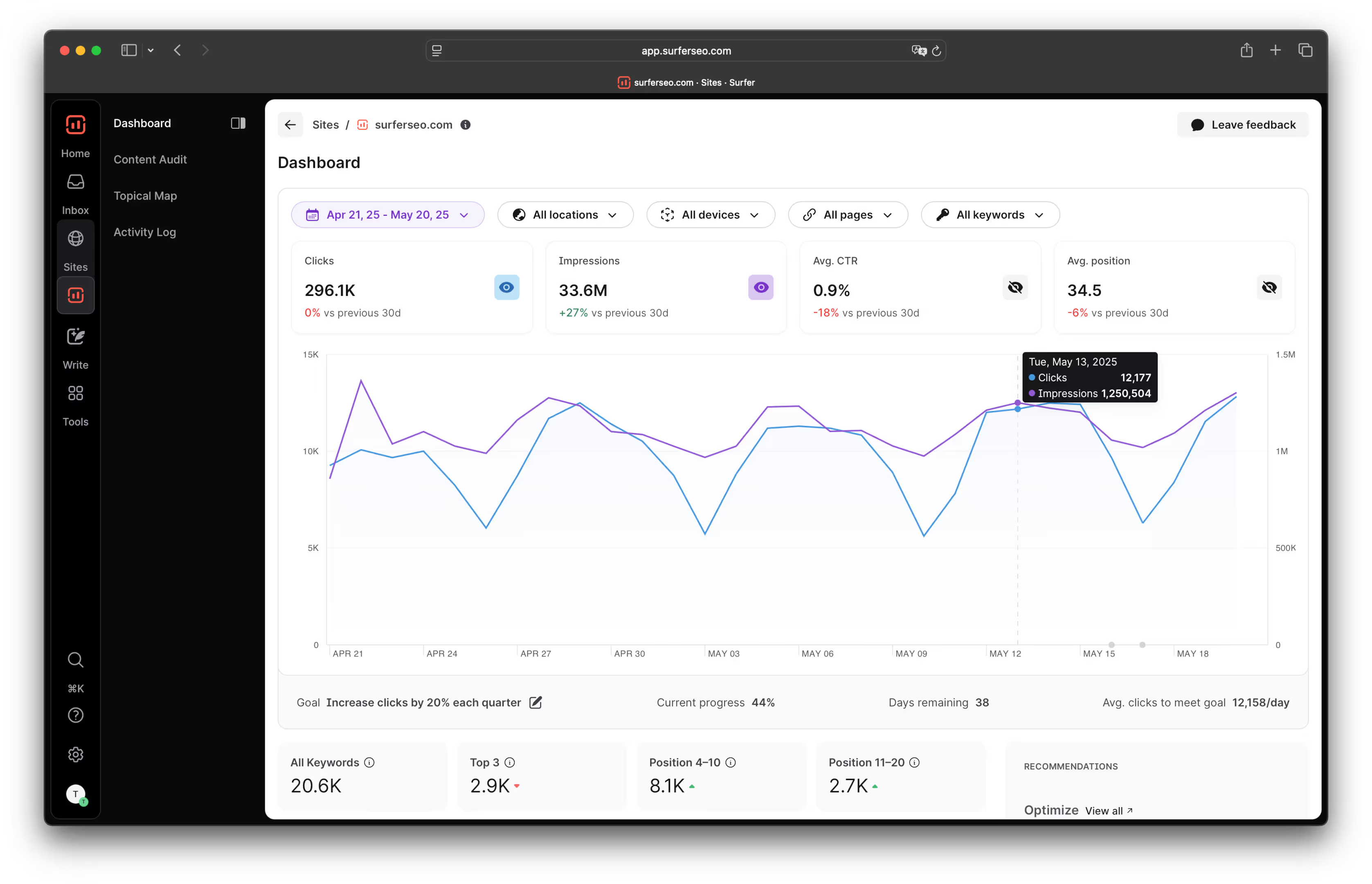
Surfer also supports content repurposing, letting you turn blog content into social media posts or email copy with Surfy’s contextual awareness or through the use of Templates, which you can find inside the AI Humanizer tool.
This is something that MarketMuse doesn’t offer.
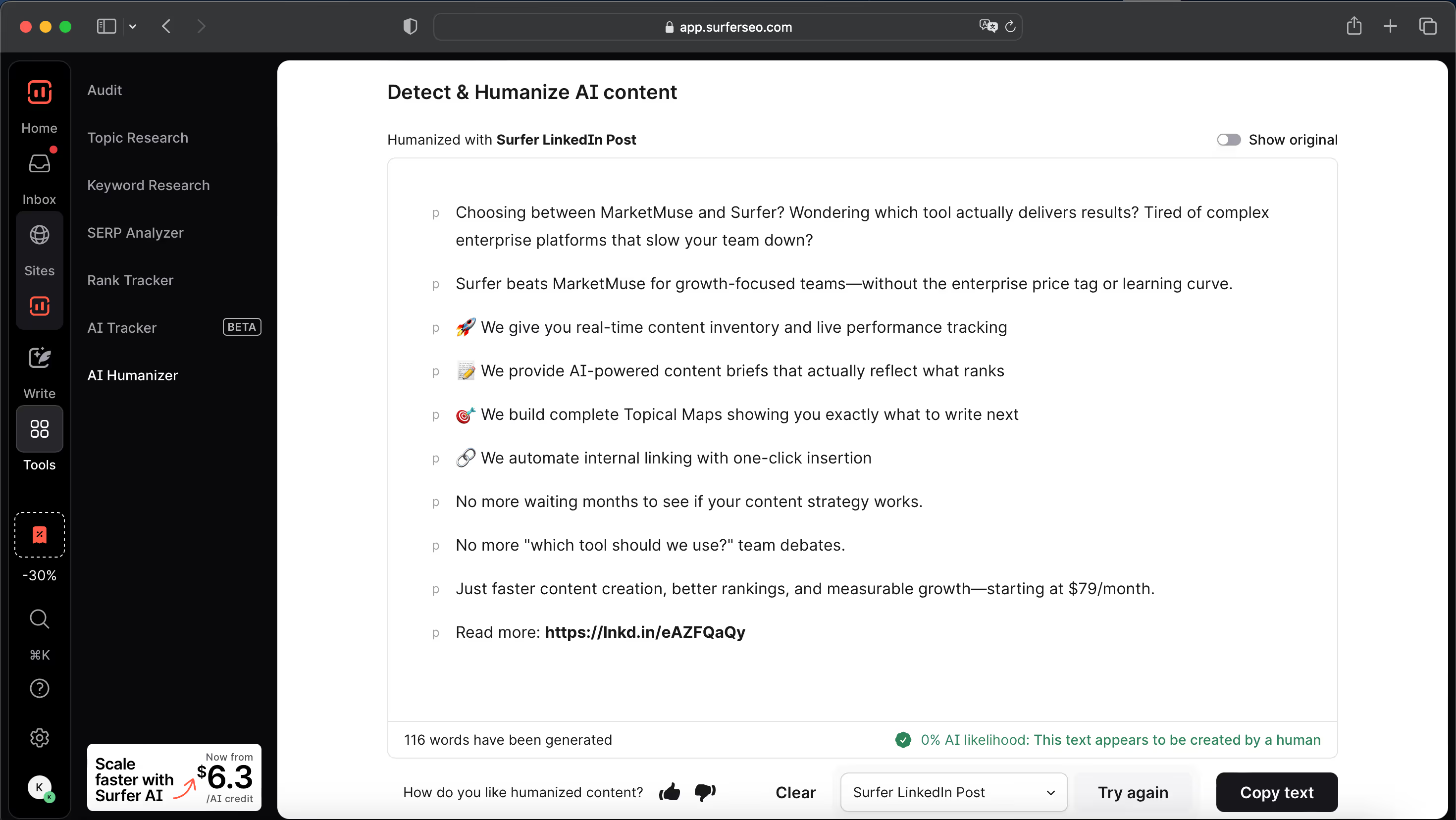
If you want a platform that not only helps plan content strategy but also supports seamless execution and ongoing performance, Surfer is one of the most complete MarketMuse alternatives available.
👉 Want a detailed head-to-head comparison? Check out our full MarketMuse vs Surfer breakdown to see which platform is right for your team.
2. Clearscope
Clearscope is another Marketmuse alternative that can help create search-optimized content.
The content editor works similarly to MarketMuse.
As you write, Clearscope gives your article a grade based on how well you’ve covered the topic and if you've used the recommended keywords throughout your content.

Plus, it integrates with Google Docs, WordPress, and Microsoft Word, so you can work wherever you prefer while still making the most of Clearscope’s SEO tools.
Its audit features help you monitor SEO performance, spot issues, and keep track of which articles are declining and need a refresh. It connects with both Google Search Console and Google Analytics to give you a clear breakdown of different site metrics.

3. Frase
Frase is a content optimization tool designed to help you create ready-to-rank content with its SEO text editor and other AI features.
You start by running SERP research. Enter your primary keyword, and Frase analyzes the top-ranking pages—breaking down details like word count, internal and external links, domain authority, and the headings used in each article.

Based on the SERP analysis, you can also have Frase’s AI generate a content brief for the article, this includes a general overview of the SERP results, an outline for your article, and topic clusters to target.
The ‘Optimize’ tab on the right sidebar gives you access to the content editor. Like MarketMuse, Frase provides an overall content score, along with recommendations for word count, number of headings, links, and images to include. It also lists related keywords and suggests how often to use them.

Frase’s AI can also help write your article for you. You can either give it a custom prompt or choose from the dropdown menu of pre-set options for what you want the AI to achieve.

4. Outranking.io
Outranking is a content research and optimization tool that comes with many of MarketMuse's core features.
Start with a keyword—Outranking conducts a competitive analysis of the ranking pages on the SERP to identify which secondary keywords to prioritize. Using this information, it uses AI to generate a structured outline.
Unlike MarketMuse, Outranking also considers elements like statistics, tables, and list items in an article to determine its content score.

It also comes with an AI writing tool that handles everything from generating titles and outlines to pulling in research and statistics from top-ranking pages and incorporating them into your article.
Outranking also integrates with Google Search Console to help you monitor your website’s performance and provide internal linking suggestions.

5. Content Harmony
Content Harmony is best known for its content brief generation features, but it also has other reliable on-page optimization tools that rival MarketMuse.
Enter your target keyword, and Content Harmony will generate the content brief for your article. You can choose from a range of templates—these only affect the visual layout of your brief and don’t influence its functionality.

The Content Grader works much like other tools—Content Harmony highlights relevant keywords and phrases to include, along with a recommended readability level and an overall content score.
However, unlike MarketMuse’s numerical grading system, Content Harmony uses a scale of Poor, Fair, Good, and Great to assess your content.

Both grading systems follow the same general logic to score your content: evaluating topic coverage based on the keywords used, so there’s no definitive “better” option. It comes down to what you prefer working with.
6. Dashword
Dashword has all the tools to help you create search-optimized, high-quality content.
You can choose between two options: creating a content brief or jumping straight into the content editor to start writing SEO-optimized content.
Choosing the brief option gives you a deeper breakdown of the page's ranking for your keyword. You’ll see their individual content scores and the exact outlines they’ve used. You can handpick headings from competitors to include in your own brief with a simple click. Plus, you can easily drag and rearrange those headings to structure your brief however you like.

The content editor interface is similar to that of MarketMuse. On the right, you’ll see the keywords generated from the SERP analysis, while the left panel displays your content score, word count, and readability level.
As you incorporate the recommended keywords, your content score improves accordingly, and each used keyword gets highlighted within your text.

Dashword also comes with an AI writing feature, but it’s fairly limited. For example, you can’t refine specific sections of the text using prompts.
7. INK for All
Ink for All is built around three core functions: research, writing, and optimization.
The keyword research function will yield results related to your primary keyword, along with their related metrics. Unlike MarketMuse and most other platforms, Ink doesn’t display the keywords directly within its native platform; you will instead have to download it as a CSV.
Its AI writing features let you dictate what you want your article to cover. You can prompt the AI directly in the content editor, which reduces friction during the writing process.

The SEO features are built on the same scoring principle as MarketMuse, but the process to improve the score is divided into different "tasks." These include:
- Relevant Topics: Takes into account topical breadth and depth, including related keywords used throughout the article
- Content Shield: Detects AI-generated text and plagiarism to maintain originality
- Word Tasks: Covers word count, readability grade, hard-to-read sentences, and passive voice detection
- Document Tasks: Takes into account proper metadata and alt-text usage
- Headline Tasks: Analyzes relevance and the emotions the headline evokes

8. NeuronWriter
NeuronWriter is another option that provides features similar to those of MarketMuse, including a content editor, SERP analysis, and competitor insights.
Neuron takes a little longer than most tools to set up its content editor—I had to wait 3–4 minutes after the SERP analysis—but once it's ready, you can start writing your article.
The interface itself is fairly standard. To the right of the screen, you'll see the different keywords to include in your content to improve your score, along with an option to automatically insert these within your content.

This is also where you'll find the AI writing tab. Neuron offers several tools to support your writing, including an intro generator and more.
What stands out, though, is the Content Designer. It analyzes SERP results to generate an outline and adds relevant insights from top-ranking pages.

9. WriterZen
WriterZen has features like topic discovery, keyword explorer, keyword planner, a content creator, and more.
The Content Creator feature helps you build an entire article from start to finish. Simply enter your seed keyword, choose a tone, and generate an outline using WriterZen’s AI tools. Once in the editor, you’ll see a content grade, insights on what works well (and what doesn’t), and guidelines like word count, image recommendations, and more.

The downside is that WriterZen only suggests keywords you manually selected during the research process—it doesn’t automatically generate clusters like MarketMuse and Surfer.
While it does have a separate keyword clustering feature, you’ll need to import your own keyword list for the tool to group them.
10. SERanking
SERanking is an all-around SEO tool and comes with features like content auditing, rank tracking, a backlink checker, and more.
Once in the editor, you can either have the AI generate the article for you or start writing manually. But the AI writing assistant remains accessible regardless, allowing you to refine and adjust your content as you go.
The editor gives your content an overall score and offers suggestions to improve it, like ideal word count, heading structure, and keyword usage.

11. Page Optimizer Pro (POP)
Page Optimizer Pro has many of the same features as MarketMuse, plus other SEO tools that can put it a step ahead.
Among the features that the two platforms share in common is the keyword research tool and content editor.
The Content Editor, is a fairly basic feature and doesn’t offer much to write about. It does offer a content score and provides suggestions for what to include in your content (subheadings, keywords, etc.), but that’s about it.

POP's strength lies in its other SEO tools. Here are some of the features where it shines:
- POP Schema: Helps SEO professionals create and implement accurate schema markup, which aids search engines in understanding website content.
- POP Watchdog: Monitors SERP changes, alerting you to ranking shifts and providing optimization recommendations.
- POP EEAT: It analyzes your website's content and structure to identify areas where you can improve your EEAT.
12. SEMrush SEO Writing Assistant
Among SEMrush's many tools is the SEO Writing Assistant.
This includes a content editor where you write your content and a sidebar with related keywords, tone and style guidelines, and a breakdown of readability, SEO, originality, and more.

The writing assistant also helps identify missing alt text on images and flags any broken links. Plus, it evaluates your content’s readability, analyzes your tone, and ensures consistency throughout the article.
The downside is that this feature isn't available as a standalone subscription—you'll need to opt for the Guru plan, which can be more expensive than other dedicated tools.
Final thoughts
While MarketMuse is a powerful tool for content strategists, it’s not the most intuitive or all-in-one solution—especially if you're looking for smoother workflows, deeper AI integration, or more hands-on optimization support.
If MarketMuse feels limiting, Surfer offers a more complete content optimization solution. With built-in AI, real-time content scoring, and tools for better topical coverage, it’s designed to streamline your entire SEO content workflow.
Try Surfer and see the difference for yourself!


.avif)